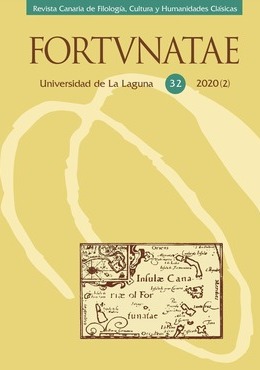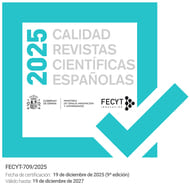Pericles y la definición de democracia (Thuc. 2.37.1): Estado de la cuestión e interpretaciones antiguas de un pasaje clave del epitafio
Resumen
El objetivo del presente trabajo es estudiar las diferentes interpretaciones que ha recibido Thuc. 2.37.1. En primer lugar, se ofrece un estado de la cuestión de las diferentes posturas adoptadas por la crítica moderna a la hora de traducir este pasaje. En segundo lugar, se lleva a cabo un análisis de cómo este texto fue interpretado en la Antigüedad.
Citas
ANDREWES, J. A. (2004): «Pericles on the Athenian Constitution (Thuc. 2.37)», AJPh 125: 539-561.
AZOULAY, V. (2010): Périclès: La démocratie athénienne à l’épreuve du grand homme, Armand Colin, París.
BANFI, A. (2003): Il governo della città: Pericle nel pensiero antico, Il Mulino, Bolonia.
BOSWORTH, A. B. (2000): «The historical context of Thucydides’ Funeral Oration», JHS 120: 1-16.
BROCK, R. (1991): «The Emergence of Democratic Ideology», Historia 40: 160-9.
CABALLERO LÓPEZ, J. A. (1982): «Aportaciones al estudio lingüístico de la República de los Atenienses», Cuadernos de investigación filológica 8: 61-102.
CANFORA, L. (1986): Tucidide, La guerra del Peloponneso, Laterza, Roma-Bari.
CANFORA, L. (2004): Democracia. Historia de una ideología, Crítica, Barcelona.
CARTLEDGE, P. (2016): Democracy. A Life, University Press, Oxford.
CHRISTODOULOU, P. (2013): «Thucydides’ Pericles. Between Historical Reality and Literary Representation», en A. TSAKMAKIS - M. TAMIOLAKI (eds.), Thucydides Between History and Literature, De Gruyter, Berlín - Boston, pp. 225-257.
CLASSEN, J. - STEUP, J. (1914): Thukydides, vol. II, Berlín.
CONNOR, W. R. (2018): «Pericles on Democracy: Thucydides 2.37.1», CW 111: 165-175.
DABDAB TRABULSI, J. A. (2011): Le Présent dans le Passé. Autour de quelques Périclès du XXe siècle et de la possibilité d’une verité en Histoire, Presse Universitaires de Franche-Conté, Beçanson.
DONINI, G. (1969): La posizione di Tucidide verso in governo dei cinquemilla, Paravia, Turín.
EDMUNDS, L. (1975): Chance and Intelligence in Thucydides, University Press, Harvard.
FANTASIA, U. (2003): La Guerra del Peloponneso. Libro II Tucidide, Pisa: ETS.
FINLEY, M. I. (1960): «Athenian Demagogues», Past and Present 21: 3-24.
FINLEY, M. I. (1980): Vieja y nueva democracia y otros ensayos, Ariel, Barcelona.
FISCHER, F. (1913): Thucydidis reliquiae in Papyris et Membranis Aegyptiacis servatae, Teubner, Leipzig.
FLASHAR, H. (1969): Der Epitaphios des Perikles. Seine Funktion im Geschichtswerk des Thukydides, Heidelberg.
FORSDYKE, S. (2001): «Athenian Democratic Ideology and Herodotus’ Histories», AJPh 122: 329-358.
FOSTER, E. (2010): Thucydides, Pericles, and Periclean Imperialism, University Press, Cambridge.
FROMENTIN, V. - GOTTELAND, S. - PAYEN, P. (eds.) (2010): Ombres de Thucydide. La reception de l’historien depuis l’Antiquité jusqu’ au debut du XXe Siècle, Ausonius, Bordeaux.
GIBSON, C. A. (2004): «Learning Greek History in the Ancient Classroom:The Evidence of theTreatises on Progymnasmata», CPh. 99: 103-129.
GIBSON, C. A. (2008): Libanius’s Progymnasmata: Model Exercises in Greek Prose Composition and Rhetoric, Society of Biblical Literature, Atlanta.
GOMME, A. W. (1948): «Thucydides Notes», CQ 42: 10-14.
GOMME, A. W. (1956): A Historical Commentary on Thucydides, Vol. II, Clarendon Press, Oxford.
GRANT, J. R. (1971): «Thucydides 2.37.1», Phoenix 25: 104-107.
GREENWOOD, E. (2015): «On translating Thucydides», en Ch. LEE - N. MORLEY (eds.), A Handbook to the Reception of Thucydides, Wiley-Blackwell, Malden, MA - Oxford, pp. 91-121.
GRETHLEIN, J. (2005): «Gefahren des logos: Thukydides’ Historien und die Grabrede des Perikles», Klio 87: 41-71.
GRETHLEIN, J. (2010): The Greeks and their Past. Poetry, Oratory and History in the Fifth Century BC, University Press, Cambridge.
HANSEN, M. H. (2008): «Thucydides’ Description of Democracy (2.37.1) and the EU-Convention of 2003», GRBS 48: 15-26.
HARRIS, E. M. (1992):«Pericles’ Praise of Athenian Democracy.Thucydides 2.37.1», HSCP 94: 157-167.
HORNBLOWER, S. (1991): A Commentary on Thucydides (Books I-III), vol. I, Oxford: Clarendon Press.
HORNBLOWER, S. (2000): «The Old Oligarch (Pseudo-Xenophon’s Athenaion Politeia) andThucydides. A Fourth-Century Date for the Old Oligarch?», en P. FLENSTED-JENSEN - Th. H. NIELSEN - L. RUBINSTEIN (eds.), Polis & Politics: Studies in Ancient Greek History, University of Copenhagen - Museum Tusculanum Press, Copenhague, pp. 363-384.
HUDE, K. (ed.) (1927): Scholia in Thucydidem ad optimos codices collata, Teubner, Leipzig.
IGLESIAS-ZOIDO, J. C. (2006): «El sistema de engarce narrativo en los discursos de Tucídides», Talia dixit 1: 1-25.
IGLESIAS-ZOIDO, J. C. (2011): El legado de Tucídides en la cultura occidental. Discursos e historia, Universidade de Coimbra, Coimbra.
JONES, A. H. M. (1957): Athenian Democracy, Blackwell, Oxford.
KAGAN, D. (1991): Pericles of Athens and the Birth of Democracy, The Free Press, Nueva York.
KAKRIDIS, J. (1961): Der thukydideische Epitaphios. Ein stilistischer Kommentar. Munchen.
KENDRICK PRITCHETT, W. (1975): Dionysius of Halicarnassus, On Thucydides, University of California Press, Los Ángeles.
KIRKWOOD, G. M. (1972):«Thucydides Judgement of theConstitution of the FiveThousand (VIII 97.2)», AJPh 93: 92-103.
KLEINLOGEL, A. (1964): «Beobachtungen zu den Thukydidesscholien I», Philologus 108: 233-246.
KLEINLOGEL, A. (1998): «Beobachtungen zu den Thukydidesscholien II», Philologus 142: 11-40.
KLEINLOGEL, A. (2011): «Beobachtungen zu den Thukydidesscholien III», Philologus 155: 257-271.
KLEINLOGEL, A. - ALPERS, K. (2019): Scholia graeca in Thucydidem. Scholia vetustiora et Lexicon Thucydideum Patmense, Walter de Gruyter, Berlín - Nueva York.
LABRIOLA, I. (1980): «Tucidide e Platone sulla democrazia ateniese», QS 6: 207-229.
LAMBERT, J. - ROBYNS, C. (1997): «Translation», en R. POSNER - K. ROBERING - Th. A. SEBEOK (eds.), Semiotics: A Handbook on the Sign -Theoretic Foundations of Nature and Culture, W. de Gruyter, Berlín, pp. 3594-3614.
LANDMAN, G. P. (1974): «Das Lob Athens in der Grabrede des Perikles», MH 31: 65-95.
LEHMANN, G. A. (2008): Perikles: Staatsmann und Stratege im klassischen Athen, C. H. Beck, Múnich.
LONGO, O. (2000): Epitafio di Pericle per i caduti del primo anno di guerra (II, 34-47), Marsilio, Venecia.
LORAUX, N. (1981): L’invention d’Athènes. Histoire de L’oraison funèbre dans la ‘cité classique’, París - La Haya - Nueva York [trad. esp. 2012: La invención de Atenas. Historia de la oración fúnebre en la ‘ciudad clásica’, Katz, Buenos Aires - Madrid].
LUSCHNAT, O. (1954): «Die Thukydidesscholien: Zu ihrer handschriftlichen Grundlage, Herkunft und Geschichte», Philologus 98: 14- 58.
LUZZATTO, M. J. (1993): «Itinerari di codici antichi: un’edizione di Tucidide tra il II ed il X secolo», MD 30: 167-203.
MAEHLER, H. (2007): «Das Thukydides-Hypomnema P.Oxy. 853 und die Scholien», en J. FRÖSÉN - T. PUROLA - E. SALMENKIVI (eds.), Proceedings of the 24th International Congress of Papyrology, Helsinki, 1-7 August, 2004, vol. II, Societas Scientarum Fennica, Helsinki, pp. 587-593.
MARTIN, Th. R. (2016): Pericles, a Biography in Context, University Press, Cambridge.
MOMIGLIANO, A. (1960):«Reseña de E. A. Havelock, The LiberalTemper in Greek Politics», Rivista Storica Italiana 72: 534-541.
MONOSON, S. S. (1998): «Remembering Pericles: The Political and Theoretical Import of Plato’s Menexenus», Political Theory 26: 489-513.
MOSSÉ, C. (2007): Pericles. El inventor de la democracia [trad. esp.], Espasa, Madrid.
MUSTI,D.(1995):Demokratía. Origini di un’ idea, Laterza, Roma - Bari[trad.esp.2000,Alianza, Madrid].
NICHOLS, M. P. (2015): Thucydides and the Pursuit of Freedom, Cornell University Press, Ithaca.
NÜNLIST, R. (2009): The Ancient Critic atWork.Terms and Concepts of Literary Criticism in Greek Scholia, University Press, Cambridge.
OBER, J. (1989): Mass and Elite in Democratic Athens, Princeton University Press, Princeton.
OBER, J. (2011): Political Dissent in Democratic Athens: Intellectual Critics of Popular Rule, Princeton University Press, Princeton.
OLIVER, J. H. (1955): «Praise of Periclean Athens as a Mixed Constitution», RhM 98: 37-40.
OSBORNE, R. (2004): The Old Oligarch: Pseudo-Xenophon’s Constitution of the Athenians [2ª ed.],
LACTOR (London Association of Classical Teachers - Original Records), Londres.
OSTWALD, M. (1987): From Popular Sovereignty to the Sovereignty of Law: Law, Society, and Politics in Fifth-Century Athens, University of California Press, Los Ángeles.
PAVÓN, J. M. (1946): Tucídides. Libro II, CSIC, Madrid [reed. Ediciones Clásicas, Madrid, 1991].
PÉBARTHE, Ch. (2007): «La question de la clientèle en Grèce ancienne: Cimon versus Péricles, patronage privé contre patronage communautaire?», en V. LÉCRIVAIN (ed.), Clientèle guerrière, clientèle foncière et clientèle électorale. Histoire er anthropologie, Editions Universitaires de Dijon, Dijon, pp. 173-197.
PÉBARTHE, Ch. (2010): «Périclès, au-delà deThucydide», en V. FROMENTIN - S. GOTTELAND - P. PAYEN (eds.), Ombres de Thucydide. La reception de l’historien depuis l’Antiquité jusqu’ au debut du XXe Siècle, Ausonius, Bordeaux, pp. 463-490.
POHLENZ, M. (1948): «Zu den attischen Reden auf die Gefallenen», SO 26: 46-74.
POPPO, E. F. (1834): Thucydidis de Bello Peloponnesiaco, vol. III, parte 2, Leipzig.
POWELL, A. (2010): «Périclès chez Thucydide et chez Plutarque», en V. FROMENTIN - S. GOTTELAND - P. PAYEN (eds.), Ombres deThucydide. La reception de l’historien depuis l’Antiquité jusqu’ au debut du XXe Siècle, Ausonius, Bordeaux, pp. 93-104.
RAAFLAUB, K. A. (1990): «Contemporary Receptions of Democracy in Fifth Century Athens», en W. R. CONNOR - M. H. HANSEN - K. A. RAAFLAUB - B. S. STRAUSS (eds.), Aspects of Athenian Democracy, Museum Tusculanum Press, Copenhague, pp. 33-70.
RAAFLAUB, K. A. (1997): «Power in the Hands of the People: Foundations of Athenian Democracy», en I. MORRIS - K. RAAFLAUB (eds.), Democracy 2500? Questions and Challenges, Archaeological Institute of America, Dubuque, pp. 31-66.
REGENBOGEN, O. (1949): Thukydides. Politische Reden, Leipzig.
RHODES, P. J. (1988): Thucydides. History II, Aris & Phillips, Warminster.
RHODES, P. J. (2003): Ancient Democracy and Modern Ideology, Duckworth, Londres.
ROMILLY, J. DE (1947): Thucydide et l’impérialisme athénien: la pensée de l’historien et la genèse de l’œuvre, Les Belles Lettres, París.
ROMILLY, J. DE (1962): Thucydide. La Guerre du Péloponnèse, vol. II, Les Belles Lettres, París.
ROMILLY, J. DE (1990): La construction de la verité chez Thucydide, Julliard, París.
RUSTEN, J. S. (1989): Thucydides. The Peloponnesian War. Book II, University Press, Cambridge.
SAMONS II, L. J. (2016): Pericles and the Conquest of History: A Political Biography, University Press, Cambridge.
SANCHO ROCHER, L. (1994): «ΣΤΑΣΙΣ y ΚΡΑΣΙΣ en Tucídides (8.97.1-2), Habis 25: 41-69.
SCHADEWALDT, W. (1929): Das Geschichtschreibung des Thukydides, Berlín.
SCHWARTZ, E. (1919): Das Geschichtswerk des Thukydides, Bonn.
SHEPPARD, J. G. - EVANS, L. (1870): Notes on Thucydides, Longmans, Londres.
SICKING, M. J. (1995):«The General Purport of Pericles’ Funeral Oration and Last Speech», Hermes 123: 404-425.
STADTER, P. A. (1987): «The Rhetoric of Plutarch’s Pericles», Ancient Society 18: 251-259.
STADTER, P. A. (1989): A Commentary on Plutarch’s Pericles, University of North Carolina Press, Chapel Hill - Londres.
STE. CROIX, G. E. M. DE (1956): «The Constitution of the Five Thousand», Historia 5: 1-23.
STRASBURGER, H. (2009): «Thucydides and the political self-portrait of the Athenians», en J. S. RUSTEN (ed.), Thucydides, University Press, Oxford, pp. 191-219.
TURASIEWICZ, R. (1995): «Pericles’ Funeral Oration in Thucydides and its Interpretation», Eos 83: 33-41.
VICKERS, M. (2011): Pericles on Stage: Political Comedy in Aristophanes’ Early Plays, University Press,Texas.
VIDAL-NAQUET, P. (1990): La démocratie grecque vue d’ailleurs: Essais d’ historiographie ancienne et moderne, Flammarion, París.
VLASTOS, G. (1964): «Isonomía Politiké», en J. MAU - E. G. SCHMIDT, Isonomia: Studien zur Gleichheitsvorstellung im griechischen Denken, Berlín, pp. 1-35.
VRETSKA, H. (1966): «Perikles und die Herrschaft des Würdigsten, Thuk. II 37.1», RhM 109: 108-120.
WARNER, R. (1954): Thucydides. History of the Peloponnesian War, Penguin, Londres.
WILL, W. (2003): Thukydides und Perikles. Der Historiker und sein Held, Habelt, Bonn.
WILL,W.(2016):«Democracy without an Alternative:Thucydides, Sparta, and Athens»,enCh. R. THAUER - Ch. WENDT (eds.), Thucydides and Political Order. Lessons of Governance and the History of the Peloponnesian War, Palgrave Macmillan, Nueva York, pp. 55-73.
WINTON, R. I. (2004): «Thucydides 2.37.1: Pericles on Athenian Democracy», RhM 147: 26-34.
ZIOLKOWSKI, J. (1981): Thucydides and theTradition of Funeral Speeches at Athens, Arno Press, Nueva York.
Los autores conservan los derechos de autor y garantizan a la revista el derecho de ser la primera publicación del trabajo al igual que licenciarlo bajo una Creative Commons Attribution License que permite a otros compartir el trabajo con un reconocimiento de la autoría del trabajo y la publicación inicial en esta revista.
Los autores pueden establecer por separado acuerdos adicionales para la distribución no exclusiva de la versión de la obra publicada en la revista (por ejemplo, situarlo en un repositorio institucional o publicarlo en un libro), con un reconocimiento de su publicación inicial en esta revista.






